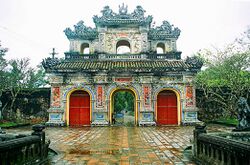Quocvangist Quenmin (Tyran): Difference between revisions
BattlerNonna (talk | contribs) mNo edit summary |
BattlerNonna (talk | contribs) mNo edit summary |
||
| Line 38: | Line 38: | ||
<!-- Flag navigation: Preceding and succeeding entities p1 to p5 and s1 to s5 --> | <!-- Flag navigation: Preceding and succeeding entities p1 to p5 and s1 to s5 --> | ||
|p1 = Cửa Đóng<!-- Name of the article for preceding entity, numbered 1-5 --> | |p1 = Cửa Đóng<!-- Name of the article for preceding entity, numbered 1-5 --> | ||
|flag_p1 = | |flag_p1 = EmpireOfQuenmin.png<!-- Default: "Flag of {{{p1}}}.svg" (size 30) --> | ||
|image_p1 = <!-- Use: [[File:Sin escudo.svg|20px|Image missing]] --> | |image_p1 = <!-- Use: [[File:Sin escudo.svg|20px|Image missing]] --> | ||
|p2 = | |p2 = | ||
| Line 59: | Line 59: | ||
|s5 = | |s5 = | ||
|flag_s5 = | |flag_s5 = | ||
|image_flag = | |image_flag = QuocvangistPartyFlag.png<!-- Default: Flag of {{{common_name}}}.svg --> | ||
|flag_alt = [[Imperial Quenminese Standard]]<!-- Alt text for flag --> | |flag_alt = [[Imperial Quenminese Standard]]<!-- Alt text for flag --> | ||
|image_flag2 = <!-- Second flag --> | |image_flag2 = <!-- Second flag --> | ||
Latest revision as of 08:31, 19 February 2022
Empire of Quenmin | |||||||||
|---|---|---|---|---|---|---|---|---|---|
| 1935–1945 | |||||||||
|
Flag | |||||||||
| Capital | Cao Khoát | ||||||||
| Common languages | Quenminese | ||||||||
| Religion | Haimeism | ||||||||
| Government | Unitary Quocvangist one-party totalitarian dictatorship under a constitutional monarchy | ||||||||
| Emperor | |||||||||
• 1935 – 1945 | Đức Khểnh | ||||||||
| Prime Minister | |||||||||
• 1935 – 1945 | Lý Học Thao Viên | ||||||||
| History | |||||||||
| 10 October 1935 | |||||||||
| 15 September 1941 | |||||||||
| 28 May 1945 | |||||||||
| Currency | Tiền (Ѧ) | ||||||||
| |||||||||
| Today part of | Quenmin, Aichi, Tamau, Kansdoen, Melaskana | ||||||||
Part of a series on the |
|---|
| History of Quenmin |
 |
Quocvangist Quenmin (Quenminese: Kỷ nguyên Đạo Quốc Vàng), also known as the Lý Viên regime, the Quocvangist regime, the Golden Nation Era, and sometimes Golden Quenmin in the Quenminese vernacular, was an era of totalitarian dictatorship presided by Prime Minister Lý Học Thao Viên from 1935 to 1945. With Emperor Đức Khểnh playing a significant role in the Golden Nation Party's dominance in the Imperial Quenminese government, he prompted the resignation of Ngô Minh Xuân and appointed Viên as Prime Minister. Once in power, Viên and the Quocvangists dissolved parliament, stifled political opposition, and imposed stringent control over the media, military and political institutions. Despite the country's authoritarian leanings, the Quocvangists ensured Quenmin's place among the Common Axis, and implemented mass mobilization and compulsory service in a collaborative effort to counter the Inner Sphere during the Siduri War.
After the war, Quenmin enjoyed its new territorial gains of Kansdoen and Melaskana. Viên then promoted economic growth by allowing industries to profit under an authoritarian capitalist model. By mid-1941, the Empire's economy returned to its original pre-war status. On July 1, Quenmin's war with Tamau resulted in the latter's annexation, which would prove consequential in the later years of Quocvangist rule. With anti-Quocvangist and nationalist activism emerging throughout the Empire, Viên would implement harsher and stricter policies against dissidents, ushering a reign of terror that lead to thousands of dissidents tortured, executed, or exiled. A new constitution was also ratified for Viên and his party to remain in power indefinitely, coupled with the dismantling of the parliamentary system, thereby erasing the last vestiges of democracy. Quocvangist rule was eventually abolished on 28 May 1945 as a result of the Turquoise Revolution, which saw not only the resignation of Viên and his government, but also the abdication of Đức Khểnh, the dissolution of the Golden Nation Party, and the independence of Tamau, Kansdoen and Melaskana.
Despite Quenmin's return to democracy during the Tự Do Hóa era, the political and economic legacy of the Quocvangist regime resonated with the conservative elements of the Yellow Dragon and the Nationalist Parties. It would express itself in their reactionary sentiments during the Hidebound Era, which observed the stringent political censorship and limitation of civil liberties promoted by Nguyễn Công Thịnh Bảo.
